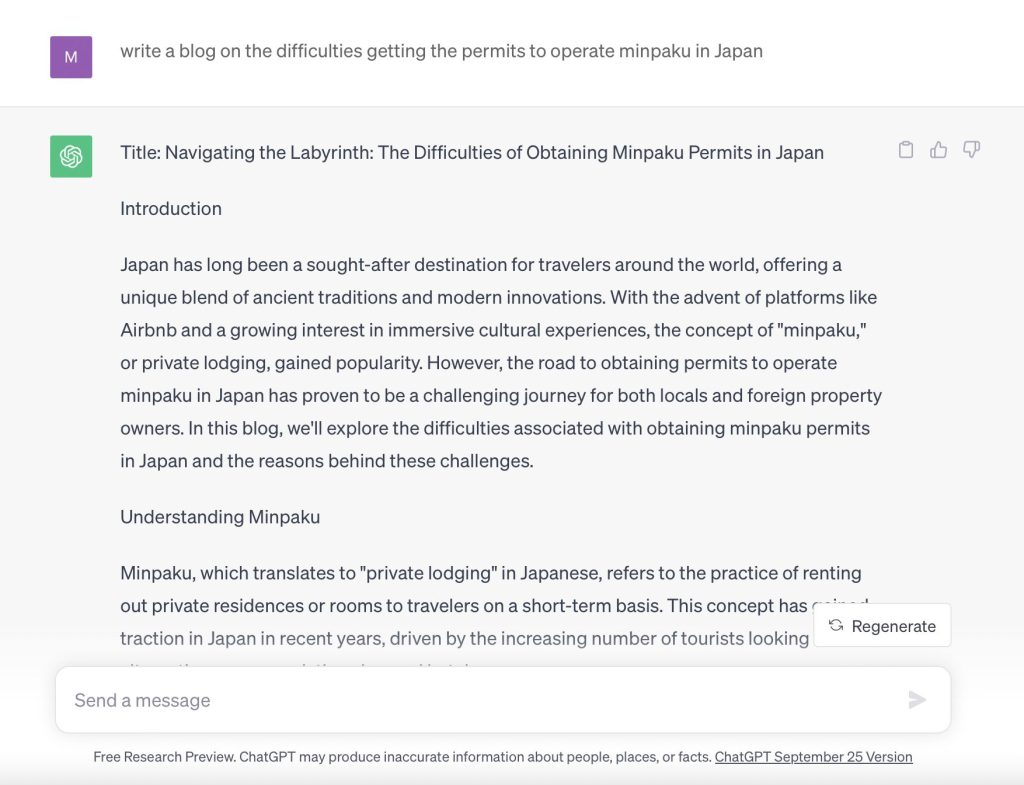
Japan has long been a sought-after destination for travelers around the world, offering a unique blend of ancient traditions and modern innovations. With the advent of platforms like Airbnb and a growing interest in immersive cultural experiences, the concept of “minpaku,” or private lodging, gained popularity. However, the road to obtaining permits to operate minpaku in Japan has proven to be a challenging journey for both locals and foreign property owners. In this blog, we’ll explore the difficulties associated with obtaining minpaku permits in Japan and the reasons behind these challenges.
Understanding Minpaku
Minpaku, which translates to “private lodging” in Japanese, refers to the practice of renting out private residences or rooms to travelers on a short-term basis. This concept has gained traction in Japan in recent years, driven by the increasing number of tourists looking for alternative accommodations beyond hotels.
The Difficulties of Obtaining Minpaku Permits
- Complex Regulations: One of the primary difficulties in obtaining minpaku permits in Japan stems from the intricate and frequently changing regulations. Local governments in Japan are responsible for issuing these permits, and the requirements and processes vary from one municipality to another. This lack of standardization can make it incredibly challenging for property owners to navigate the legal landscape.
- Zoning Restrictions: In many cases, minpaku operators must adhere to strict zoning regulations. Some areas are designated for residential use only, while others permit minpaku operations. These zoning restrictions can limit the availability of properties that are eligible for minpaku permits, further complicating the process.
- Neighboring Consent: To operate a minpaku property, neighbors’ consent is often required, and this can be a significant hurdle. Obtaining the approval of neighbors can be a time-consuming and uncertain process, as not everyone may be welcoming to the idea of short-term renters in their vicinity.
- Language Barrier: Language barriers can pose another challenge for foreign property owners looking to obtain minpaku permits in Japan. Many of the application materials and interactions with local authorities are conducted in Japanese, making the process daunting for those who are not proficient in the language.
- Enforcement and Penalties: Japan has implemented stringent penalties for operating minpaku properties without the proper permits. Violators can face substantial fines, and in some cases, even criminal charges. This has created a climate of fear and hesitation among property owners, further complicating the permitting process.
- Limited Permits: Some local governments have imposed limits on the number of minpaku permits they will issue in their areas. This is often done to balance the interests of residents and maintain the character of neighborhoods. As a result, there can be fierce competition among property owners for the limited available permits.
- Changing Regulations: The regulatory landscape for minpaku in Japan is constantly evolving. New laws and ordinances are regularly introduced at the local and national levels, making it challenging for property owners to stay compliant with the latest requirements.
Conclusion
While minpaku offers a unique and often more affordable accommodation option for travelers in Japan, the difficulties associated with obtaining permits to operate minpaku properties cannot be overlooked. The complex and ever-changing regulatory environment, zoning restrictions, neighbor consent requirements, language barriers, and the risk of penalties all contribute to the challenges property owners face.
To navigate these difficulties, prospective minpaku operators must carefully research the specific requirements of the municipality in which they intend to operate and seek legal counsel or consulting services to ensure compliance with the latest regulations. As Japan continues to grapple with the balance between tourism and residential interests, the future of minpaku remains uncertain, but for those who persevere, the rewards of providing unique lodging experiences in this beautiful country can be worth the effort.

For additional information or any questions please contact us here
Email: info@remax-apex.com

